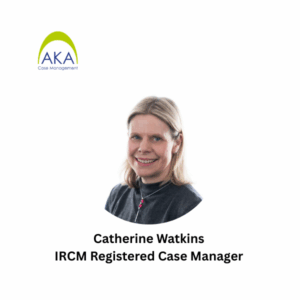
For Catherine Watkins, a case manager with a background in music therapy, the journey into case management has been marked by a strong commitment to professional development and validation.
Catherine recently shared her thoughts on the importance of registering with the Institute of Registered Case Managers (IRCM), offering a candid perspective on why this step matters, not just for professionals, but for the individuals and families they support.
Validation and Reassurance
For Catherine, IRCM registration is more than a formality. It represents a meaningful validation of her clinical and case management experience. Coming from a profession not traditionally associated with case management, she sees registration as a way to affirm that her background of over 10 years as an HCPC-registered music therapist specialising in neurodisability and Neurologic Music Therapy practice, combined with over two years of case management experience, meets the standards required to work effectively in the field.
“It’s important validation that my clinical experience is as valid as anyone else’s,” she explains. “It reassures clients, families, and professionals that an external body has verified our competence and experience.”
A Commitment to Standards
Catherine emphasises that IRCM registration signals a commitment to safeguarding those who use case management services. It complements other professional registrations and provides a layer of oversight that benefits everyone involved, from solicitors to healthcare professionals, and most importantly, the individuals receiving support.
“It’s about ensuring that families and professionals know what they’re getting. There’s oversight, and that’s important.”
Barriers and Perceptions
While the registration process itself is straightforward, essentially a paperwork exercise requiring evidence of experience, Catherine acknowledges that some may question its value, particularly those with long-standing careers in case management.
“For someone who’s been a case manager for 15 years, they might ask, ‘Why bother?’ But for those of us newer to the profession, it feels like an important milestone.”
She believes the real barrier lies in perception: whether professionals see registration as a positive step for the field. As with any emerging standard, it takes time for a sector to embrace regulation or oversight fully.
Looking Ahead
The IRCM is working towards accreditation with the Professional Standards Authority, developing a Certificate of Proficiency in Case Management and an accreditation framework for case management training. Catherine sees this as a promising development that will further enhance trust and accountability in case management.
“Case management is not a protected title like music therapy or occupational therapy, but IRCM is moving in that direction.”
Ultimately, registration is about more than professional validation. It is about demonstrating to families, solicitors, and other professionals that case managers are accountable, committed, and qualified to provide the best possible support. As Catherine notes, “It benefits the people we work with. They know they are in safe hands.”